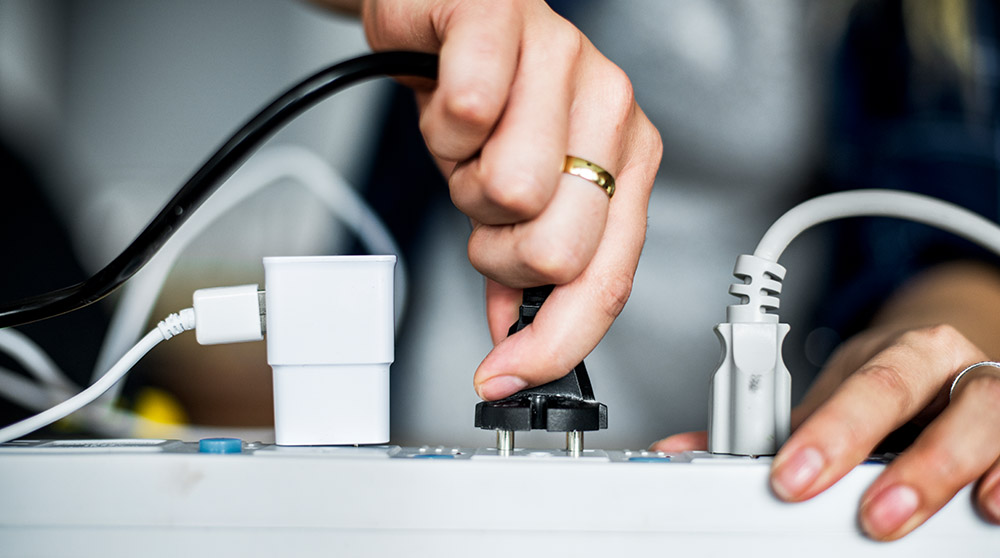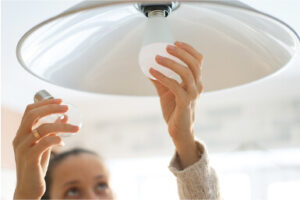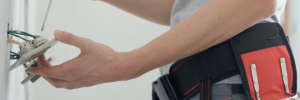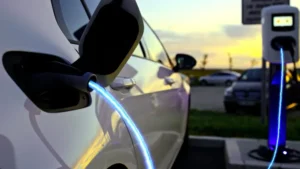Keep Your Home Safe: Electrical Safety Tips for Homeowner

Introduction
Electricity is part of our daily life. We use it from waking up to bedtime. Because it’s such a common part of our lives, we sometimes forget how powerful and dangerous it can be.
While it’s always a good idea to consult a professional for any type of electrical repair or electrical upgrade, Here are 10 electrical safety tips that can help protect you and your family.
1. Check that you are Using the Correct Wattage in All your Fixtures and Appliances.
Using the right lightbulbs can prevent electrical problems. So check all lights, fixtures and appliances to make sure you are using the correct wattage. If a light does not have a specified wattage, use 60 watt or less bulbs. For unmarked overhead lights, choose 25-watt light bulbs.
2. Watch out for Overloaded Outlets to Protect your Home.
An overloaded outlet is a common cause of electrical problems. Check all outlets to ensure they are cool to the touch, have protective faceplates, and are in good condition. According to ESFI, here are some outlet safety tips you can follow:
- Do not use extension cords or multi-plug device converters.
- Only plug one heat-producing device into an outlet at a time.
- Hot outlets should be checked by a qualified electrician.
- Remember that power strips only add outlets and don’t change the amount of power the outlet receives.
- Smart outlets can be used to monitor outlet current loads and even turn off devices if an outlet starts to overheat.
- Replace or repair damaged power cords to keep your home safe.
See this related Article: Top Electrical Upgrades to Enhance Safety for your Residential Homes
3. Damaged Power Cords Pose a Serious Hazard to Residential Electrical Safety.
They can cause both fires and electric shocks. All power cords and extension cords should be inspected regularly for signs of fraying or cracking and repaired or replaced as necessary. Power cords should not be stapled or routed under carpets or furniture. Wires under carpets are a trip hazard and can overheat, while furniture can damage wire insulation and damage wires.
Regular use of extension cords can result in not having enough outlets to meet your needs. In rooms where you frequently use extension cords, have additional outlets installed by a qualified electrician who is familiar with electrical safety codes. When purchasing a power cord, consider the electrical load it can carry. A cable with a 16 AWG load can carry up to 1375 watts. For heavier loads, use 14 or 12 AWG wire.
4. Keep Your Used and Unused Cables Organized and Safe to Avoid Damage.
Electrical safety rules don’t just apply to power cords during use – cords must also be stored securely to prevent damage. Keep the cords out of the reach of children and pets (who may chew or play with the cords). Avoid wrapping cords tightly around objects. This can cause the cable to stretch or overheat. Never lay a cable on a hot surface to avoid damaging the cable insulation and wires.
5. Unplug All Unused Devices to Reduce Potential Risk.
One of the easiest electrical safety tips is also one of the easiest to forget: When an appliance is not in use, unplug it from the outlet. Not only does this save you energy by reducing phantom consumption (the amount of power the device consumes even when it’s not actively being used), but unplugging unused devices also protects them from overheating or power surges.
It’s often hard to think of unplugging devices that aren’t in use, but the new generation of smart plugs offers a solution that allows you to set power plans for each plug.
6. Keep Electrical Appliances and Outlets away from Water to Avoid Electric Shock.
Water and electricity do not mix. To comply with electrical safety regulations, keep electrical equipment dry and away from water to prevent equipment damage and protect yourself from injury and electric shock. It is important to have dry hands when working with electrical equipment. Keep electrical equipment away from flower pots, fish tanks, sinks, showers and bathtubs to reduce the risk of contact between water and electricity.
7. Give your Devices enough space for Air Circulation to Avoid Overheating.
Without adequate airflow, electrical equipment can overheat, shorting out and creating an electrical fire hazard. Ensure good air circulation for your devices and avoid operating electrical devices in closed cabinets. Also, for better electrical safety, it is important to keep flammable items away from all appliances and electronic devices. Pay particular attention to your gas or electric clothes dryer as it needs to be at least a foot away from the wall for safe operation.
8. Make Sure All Fans and Exhaust Fans are Clean to avoid Fire Hazard.
Some units have exhaust fans that can become dirty or clogged with debris, making the unit more efficient. This can shorten the life of the device and pose a hazard to the home through overheating or even the formation of dangerous gases that can lead to an electrical fire. Regular cleaning of the exhaust fans helps to prevent such risks.
9. Always Follow Device Instructions to Improve Electrical Safety.
“Read the instructions” should be at the top of your list of home electrical safety tips. Knowing how to use devices safely improves both the performance of your device and your personal security. If you get even a minor electric shock from an appliance, do not use it until a qualified electrician has checked for problems.
10. You should Pay Attention to Heaters and Water Heaters to Avoid Possible Accidents.
Flammable objects should be kept away from space heaters and built-in stoves. To ensure the safety of the stove, store flammable materials away from heating devices. Portable heaters should not be used near curtains. To prevent tipping, they should never be placed on a stable surface.
Also, do you know what temperature your water heater is set to? High temperature settings eat up the energy of your water heater and can cause accidental burns and scalds, especially in homes with young children.
While these tips are a good start to ensure your safety. However, the best way to protect your family and home from the risk of electrical fire or shock is to hire a qualified, licensed electrician to perform all electrical work in your home.
Be Like A Poss: When Hiring Experts That You Can Trust
Price is important, but when choosing an electrician, consider the big picture. An electrician Woodstock, GA will show you character, expertise, ease of working together, and overall value. A big part of an electrician’s value is getting the job done properly and safely without taking up too much of your time or bothering you. A very knowledgeable electrician can save you money by suggesting more efficient ways to do a job or conserve electricity. Having a good relationship with your electrician can save you time and money. For your next electrical project, Give Poss Electric a call about your next electrical project and we will be happy to help.




